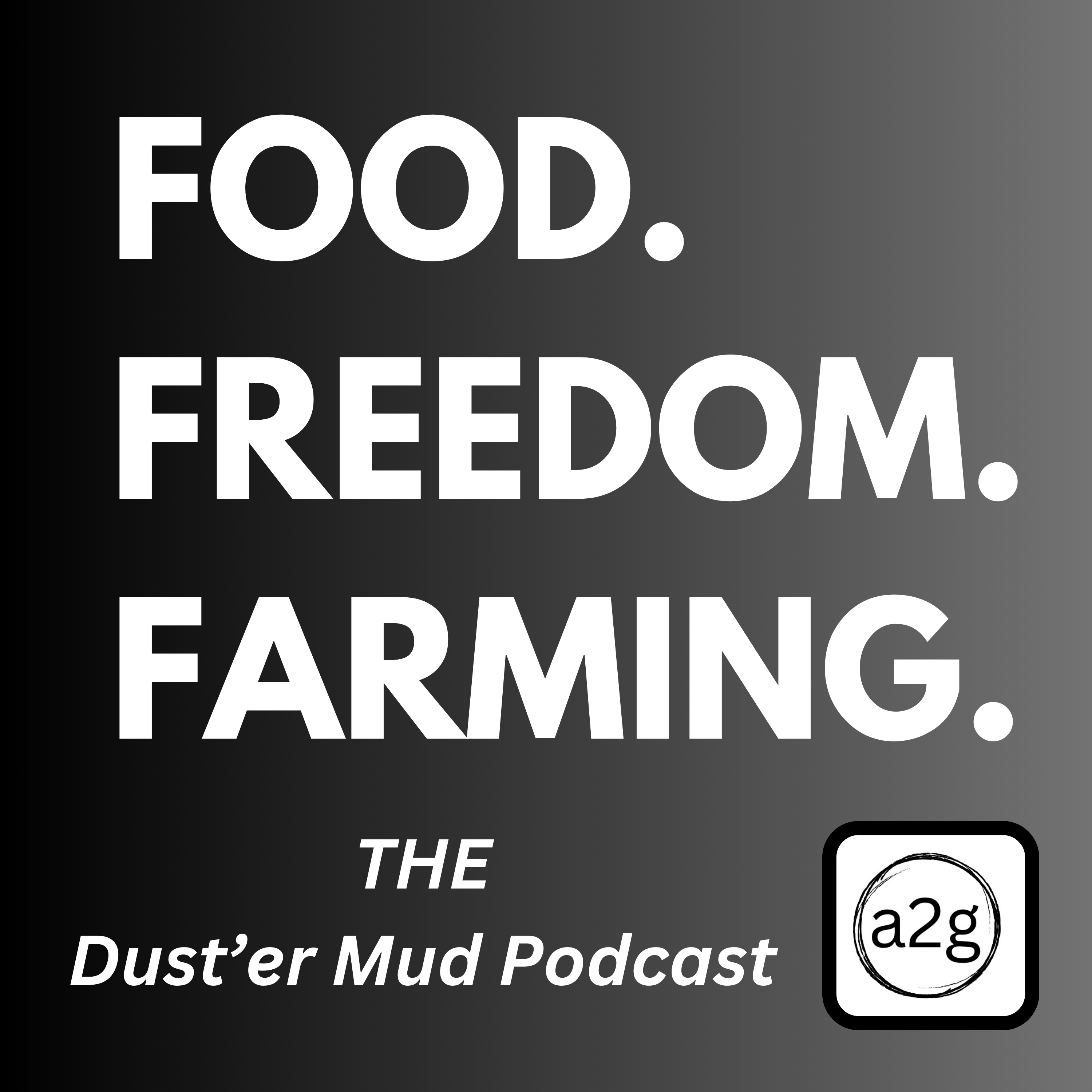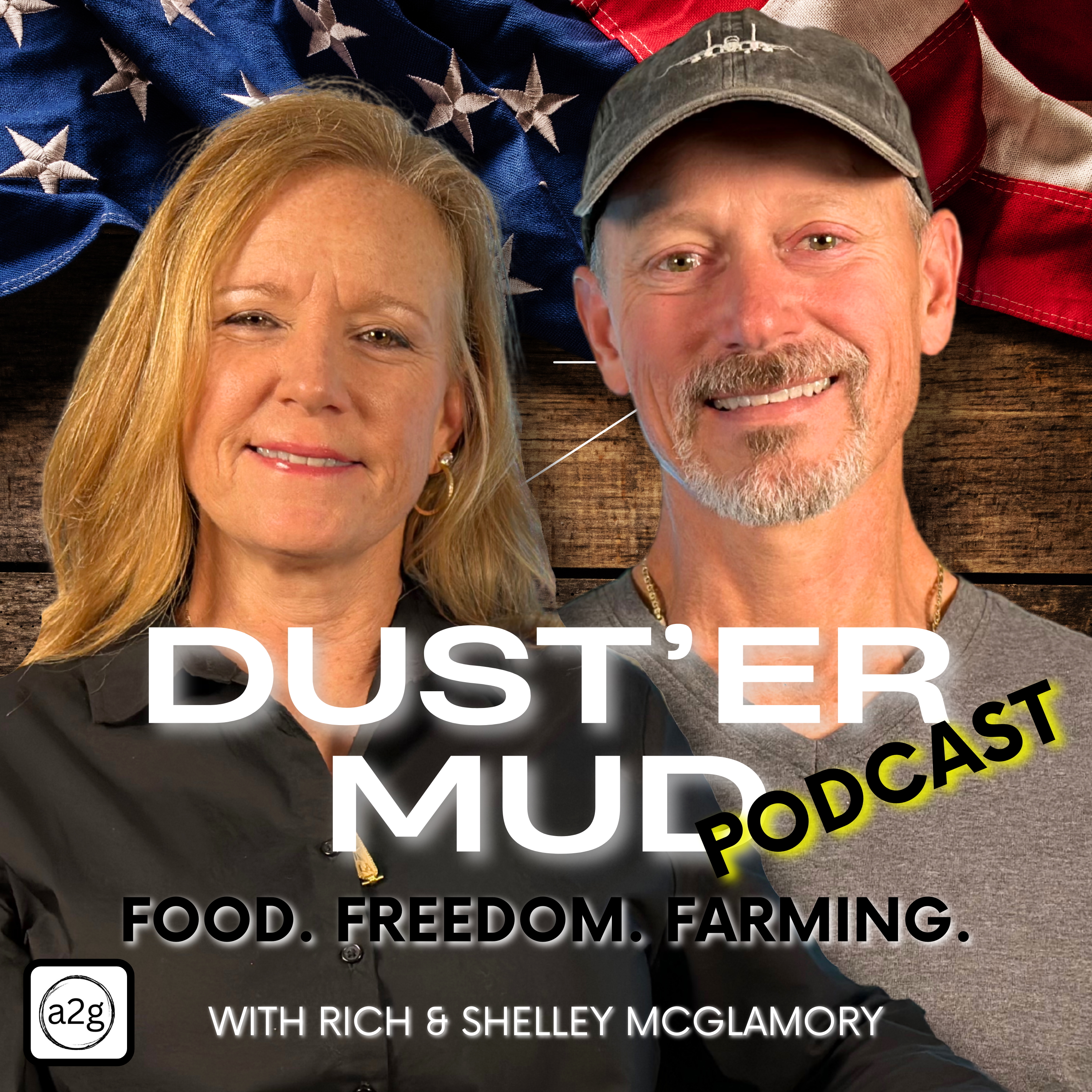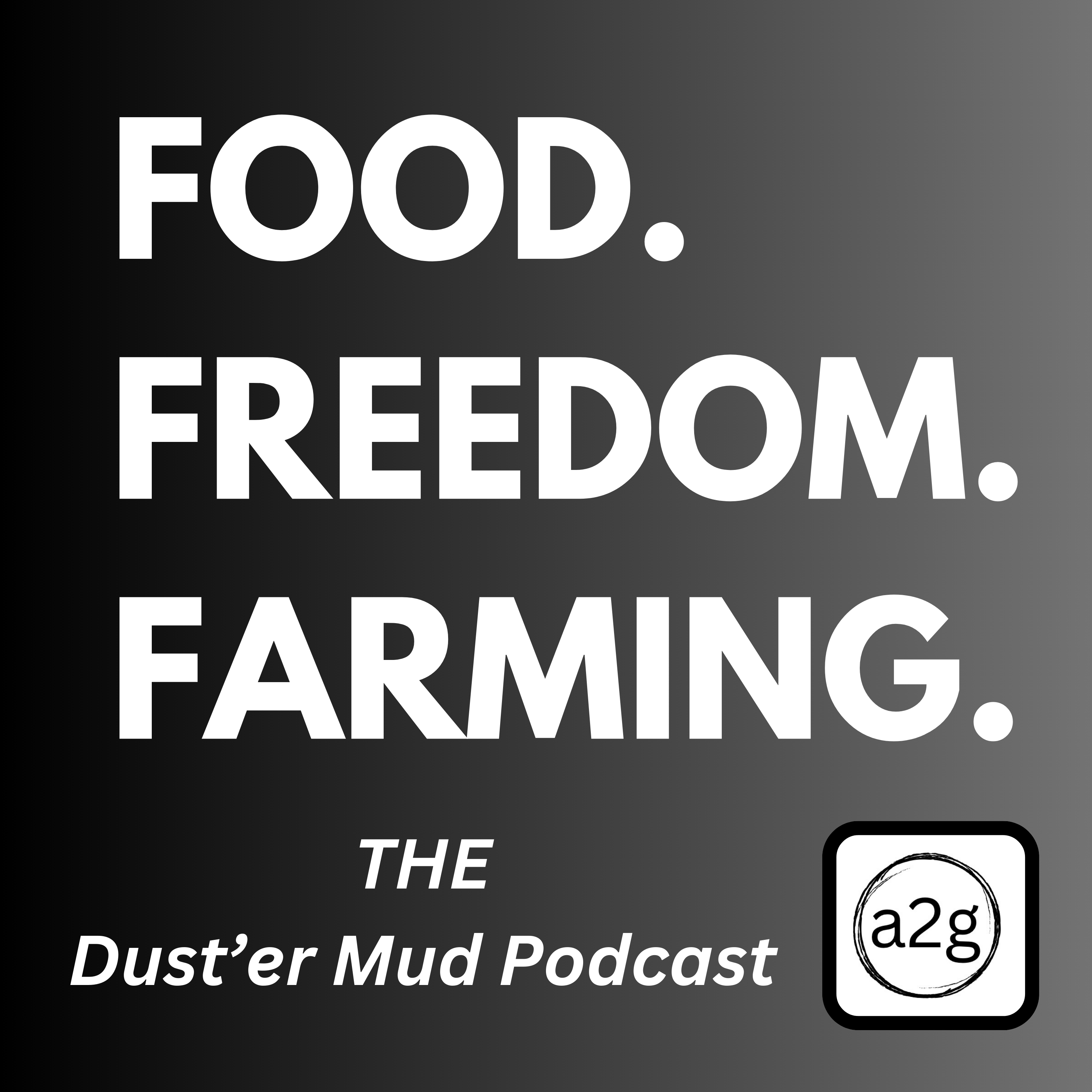Episode Transcript
[00:00:00] Speaker A: One of the headlines we saw today is McDonald's is suing the big four packing company.
[00:00:06] Speaker B: McDonald's is suing top meat packers, including Cargill, for allegedly colluding to inflate the price of beef.
[00:00:12] Speaker A: What does that mean for us at the grocery store?
[00:00:14] Speaker B: Welcome to the Duster Mud podcast, where we like to talk about food, freedom and farming. My name is Rich.
[00:00:20] Speaker A: And I'm Shelley.
[00:00:21] Speaker B: After a 25 year military career, we moved to the Ozarks of Missouri, started a regenerative farm, and became beef producers.
[00:00:31] Speaker A: So this particular article kind of caught our eye because, as it turns out, the beef industry in this country is fairly, let's just say, nearly monopolized.
[00:00:45] Speaker B: Well, 80% of the market is controlled by four different companies. We've got Tyson. Yes. The chicken people are one of the largest beef producers.
[00:00:58] Speaker A: I was kind of blown away by that one. I was like, wait, what? Tyson.
[00:01:02] Speaker B: So McDonald's is suing the big four. Tyson, Cargill, JBS, and national beef packing.
[00:01:11] Speaker A: Yeah. McDonald's says that these four companies have been colluding over the past decade ish and controlling the market price by the supply that they're allowing in. And turns out McDonald's is a really big purchaser.
[00:01:32] Speaker B: Yeah. They are using the 1890s Sherman act, which is the standard monopoly, anti Monopoly act that we all know about. And you might think, well, you just named four companies. How is that a monopoly? But the Sherman act also includes collusion to control pricing amongst a series of companies. So it's not just, you can't have one company. It's not always about mergers. It also includes trying to control pricing.
[00:02:06] Speaker A: So McDonald's is saying maybe through whistleblower type people that they have colluded, they've gotten together and decided to control pricing.
[00:02:18] Speaker B: Yeah. And interestingly, this isn't the first time that the four companies have been sued. In 2019, they faced a lawsuit as well. But that one was from beef producers like us, ranchers. Ranchers and grocery stores sued them. And a lot of that lawsuit. That litigation is still ongoing. But they have been paying out money.
[00:02:45] Speaker A: Millions and millions.
52 and a half million dollars on one settlement, $225 million plus on another settlement.
This is a big, big money thing.
[00:03:00] Speaker B: Yeah. So they haven't admitted any wrongdoing in paying out these settlements. It's basically a settlement to make the lawsuit go away. So this isn't the first time, is the point there, that they have been sued in this anti monopoly Sherman act situation. Situation, sure.
[00:03:20] Speaker A: Yeah. Okay. So you had the ranchers and the grocers and the restaurateurs and such. They're not real big, though. McDonald's is big time.
[00:03:28] Speaker B: McDonald's is the largest purchaser of beef and pork in the world. And not that it matters for this one, they're the second largest chicken purchaser as well. So when the largest buyer of beef is suing the largest producers of beef.
[00:03:50] Speaker A: Things might get interesting and they might be able to actually make some changes.
[00:03:55] Speaker B: Yeah, you could. Like, best case scenario, right. What one could hope for would be changes in the whole big food industry.
[00:04:06] Speaker A: Busted up a little bit.
[00:04:07] Speaker B: Busted up a little bit.
I don't foresee that happening. I think that would act actually against what McDonald's is looking for. McDonald's needs cheap beef. Right?
[00:04:19] Speaker A: They need cheap beef. And McDonald's is one of the primary reasons that we ended up with this particular meatpacking situation and it being so centralized is because they needed cheap beef. They need it efficient, they need it coming out fast. They don't care about the quality. They just need a lot of it.
[00:04:39] Speaker B: Not really. Yeah. You have to have it. Like, it has to be consistent. It has to be always available. Right. The volume has to be there. And one of the things that McDonald's is claiming is that these companies have artificially lowered the number of beef that they're producing, which would then, you know, if you keep the supply low, as demand goes up, the price then goes up because there's not the supply there to meet that demand. So these four companies control 80% of the beef. So, yeah. Like it is. Were they to be colluding, which is the assertion. The assertion McDonald's accuses Tyson, JBS, Cargill and the National Beef packing Company of collectively limiting supply of beef to boost prices, then they really could have an impact on the prices of beef.
[00:05:38] Speaker A: Well, McDonald's is not the only purchaser of beef. No, we're all purchasers of beef.
[00:05:43] Speaker B: That's right.
[00:05:44] Speaker A: So it isn't just affecting McDonald's price, although they get a much different price than we do, cut by cut.
It's affecting all of us at the grocery store.
[00:05:56] Speaker B: And beef prices do continue to go up and up.
[00:05:59] Speaker A: Anybody noticed that? They just seem to be on this steady rise.
[00:06:04] Speaker B: And I was looking this morning, the beef futures again for next month are up. For February of 25. They're up. For April of 25, they're up.
[00:06:15] Speaker A: So there's no end in sight for a reduction in beef prices anytime soon.
[00:06:21] Speaker B: No. And so what this also leads to is these four companies artificially keeping the prices lower. If that is true, by doing so, the other end of things, we now have the lowest national beef herd that we've had. Lowest number of beef in 70 years. And reason being, input prices continue to go up. There's droughts, hay is expensive, there's natural disasters. All of these things are making the input prices go up for those who are raising the beef.
And the companies that are buying the beef are keeping the prices down low for them.
The guys that are actually producing the beef aren't getting enough money to cover their input costs. So the herd, our national, us national herd numbers are down to the lowest they've been in 70 years.
[00:07:26] Speaker A: That's crazy. Not only does it affect the prices, but it affects the quality of beef that we're all getting, that we have access to.
I can't.
Well, I know for a fact that the quality of meat coming out of these really large packing houses is not the same as from a small regenerative style farmer producer who is doing a smaller herd.
The quality's got to be different.
[00:08:00] Speaker B: It is.
The nutritional value is different.
Cows that are grass fed, we've talked about that in previous podcasts. The omega six to omega three ratios are different. Like a grass fed cow is different. One of the things, though, is they are able to create a consistent product. When you have thousands and thousands of animals on average at this feed yard, we'll bring in and ship out about 3500 a week, standing in the same spot, eating the exact same food. From a feed standpoint, each pen is fed twice a day, and that's a formulated diet from an on staff nutritionist that we have here with the exact same weather, the sun is shining on them at the exact same time, the temperature, right. Like everything about them is exactly the same, then the product that comes out of that is exactly the same. Where, for us, we have a single beef butchered at a time that we then sell in our store. But the package of hamburger that you get this time might be slightly different than the package of hamburger you got from the last beef we had processed, because our beef comes from one cow. So that's how they're able to keep everything consistent. And that's one of the things that they have to have. And that has driven this centralized feedlot mentality, where you have these thousands of animals right there together, you can have a standardized product across the board. And what that means to the purchasers, say at a Walmart or a grocery store, is you're getting that same beef, right? Because that's what 80% of the beef production is, is making that product. Because the largest buyer of beef needs.
[00:09:48] Speaker A: That product and dictates what they grow.
[00:09:51] Speaker B: That's right. Yep. McDonald's buys over a billion pounds of beef annually.
[00:09:59] Speaker A: With a b. Yeah, that's a lot of beef.
[00:10:02] Speaker B: Right. And when you're buying a billion pounds. Oh my. Beef.
[00:10:06] Speaker A: There's the answer.
Remember the old commercial, Wendy's? Where's the beef?
McDonald's bought all of it, y'all.
Maybe.
Hey, you know, gotta light these things up.
[00:10:22] Speaker B: I don't think Wendy's would agree.
[00:10:24] Speaker A: Wendy's didn't agree.
[00:10:25] Speaker B: I don't think they would agree.
[00:10:26] Speaker A: Well, they're not at the top of the food chain.
[00:10:29] Speaker B: No, McDonald's buys the most.
[00:10:31] Speaker A: They do. Wow, that's a lot of beef.
[00:10:33] Speaker B: Yeah.
So when the big corporations do get involved, that's the product that you get even as the consumer in the grocery store.
[00:10:43] Speaker A: So the primary beef that is sold and consumed in this country is doled out by, well, 80% of it is doled out by four of the largest packing houses. What can we do as consumers if we want to, I don't know, stop, you know, being the clown in this circus kind of thing.
[00:11:07] Speaker B: Who's the McGradiest clown of them all? When you're with him, ripe as a.
[00:11:12] Speaker A: Bar and find a different source.
[00:11:17] Speaker B: Yeah.
We recommend find a local farmer.
[00:11:23] Speaker A: Vote with your dollar. And if you don't want to participate in the what all is happening in that big beef industry, try to find someone in your local area who is growing beef that you agree with how they're growing it. It's single source. Maybe you can buy it in bulk. Do a. Do a family cow share. Sometimes you can do that and get out of that system.
[00:11:53] Speaker B: You can probably find one that is raised regeneratively on a regenerative farm like ours where the cows spend their time rotating through pastures and not standing in dirt feed lots. The cows are eating grass or hay and not some kind of corn silage chop scientific mixture that includes candy and sugar and things that make them grow.
[00:12:22] Speaker A: At a specific rate, at a specific time. All of the.
[00:12:26] Speaker B: Yeah, but you can find a beef source that is growing beef the way that beef is supposed to be grown. And, you know, from an environmental perspective, there is a difference between a cow that is raised on a pasture and thousands of cows that are standing on a dirt lot.
[00:12:46] Speaker A: Absolutely.
[00:12:47] Speaker B: There is a difference there. And so I think if you're concerned at all about the quality of your beef, the way that the animal was raised, the environmental impact of the beef, of a ruminant animal, there are ways that you can mitigate those concerns. And that would be find a local regenerative farmer and still eat beef. Yeah. Well, yeah, sure.
[00:13:17] Speaker A: Eating beef is one of the most nutritious things that you can do to us, but you can still eat beef and mitigate those things you were just talking about.
[00:13:27] Speaker B: Right. By finding a local regenerative farmer.
[00:13:31] Speaker A: Right.
[00:13:31] Speaker B: And if you can't find one, there are plenty of them out there that will ship. Look at Will Harris with white oaks pastures. Got so many great videos out these days about the things that he's doing, and he ships his story.
[00:13:50] Speaker A: Will Harris's story at white oak pastures, from going from a feedlot type ag beef supplier to a regenerative farmer, is just a phenomenal story of someone who, he completely changed his operation. And it is, if you haven't seen it, I highly recommend it.
[00:14:12] Speaker B: Yeah, it's a great story in this, really. The reason that McDonald's is suing the producers highlights the problem here. The suit is because they're saying that the prices are being kept artificially high, which means we need lower priced products.
And that constant drive towards a lower priced product is what leads you into these feedlot type situations in the first place.
[00:14:45] Speaker A: Right.
Right.
[00:14:47] Speaker B: And to get away from that is go local.
[00:14:52] Speaker A: Yeah. And if at all, decentralized the situation, if they can get there, decentralizing the packing houses and spreading them back out across the country so that the supply chain is shorter to the folks, to the grocery stores, and it's just not concentrated into the control of four big multinational companies.
[00:15:19] Speaker B: So while McDonald's is suing big beef and the big four companies, and that whole battle is taking place, we've seen that's been ongoing for five years already with the last lawsuit. So while things could potentially change in the future, right now we can all make choices and we can make changes by supporting local beef producers.
[00:15:44] Speaker A: Absolutely. Go find your local beef producer, support them, and get yourself some good meat in your freezers.
[00:15:52] Speaker B: Yeah.
[00:15:52] Speaker A: We hope you enjoyed this podcast. And until next time, bye, y'all.
[00:15:56] Speaker B: Bye.


